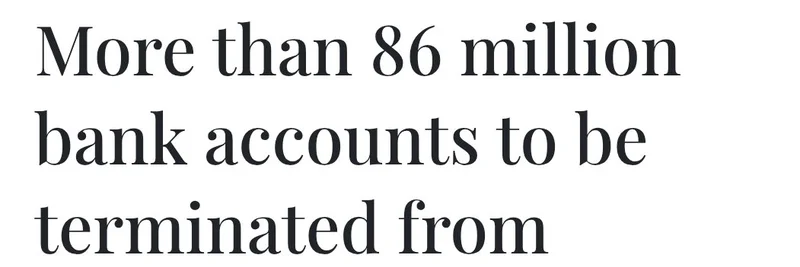In a recent tweet that's stirring up the crypto community, Mert from Helius Labs highlighted a major shake-up in Vietnam's banking system. He pointed out that the country is set to delete over 86 million bank accounts, partly because owners haven't registered for biometric authentication. His advice? Stop complaining and move your money on-chain for true control and privacy. This post, shared on X (formerly Twitter), comes at a time when traditional finance is facing scrutiny, and decentralized alternatives are gaining traction.
Understanding the Bank Account Terminations
Let's break this down. According to a report from Vietnam+ (source), the State Bank of Vietnam (SBV) is cleaning house. Out of roughly 200 million bank accounts in the country, only about 113 million personal and 711,000 organizational accounts have been properly authenticated with biometrics—like facial scans or fingerprints. The rest? They're getting the boot starting September 1, 2025.
Why the purge? It's all about security. Many of these accounts are inactive, forgotten, or even set up by bad actors for fraud, money laundering, or cybercrimes. Biometric authentication is a way to verify that the account belongs to a real person, reducing risks in digital banking. But for millions, this means losing access unless they comply. It's a stark reminder that in traditional banking, you're not fully in control—governments and banks hold the keys.
The Push Towards On-Chain Finance
Mert's tweet nails it: "You do not control your money and everyone can see you." In contrast, blockchain technology offers self-custody, where you hold your private keys and no one can freeze or delete your wallet without your consent. On-chain refers to transactions and assets stored directly on a blockchain, like Bitcoin or Ethereum, providing transparency but also options for privacy through tools like zero-knowledge proofs.
This event is already fueling discussions in the crypto world. Reports indicate that Vietnam's crackdown is acting as an "escape valve" for those affected, driving them towards Bitcoin and other cryptocurrencies (source). With 41.5% growth in crypto users recently noted, the biometric failures are accelerating adoption of decentralized finance (DeFi), where users can lend, borrow, and trade without intermediaries.
Vietnam itself is warming up to crypto. Just earlier this month, on September 9, 2025, the country launched a five-year pilot program for crypto trading, issuance, and offering under strict rules (source). Come January 2026, digital assets will be officially recognized. This regulatory shift, combined with the bank purge, could supercharge crypto's role in everyday finance.
Meme Coins Enter the Scene
Now, where do meme tokens fit into this? Meme coins, like Dogecoin or newer ones on Solana such as PEPE or BONK, are often the gateway drug to crypto. They're fun, community-driven, and volatile, but they introduce people to blockchain basics without the intimidation of complex DeFi protocols. In a country like Vietnam, where crypto adoption is already high—ranking in the top 10 globally—events like this could spark a meme coin frenzy.
Imagine someone losing their bank account access; they might turn to a simple wallet app, buy some SOL (Solana's native token), and dip into meme coins for quick trades or as a hedge. Solana, in particular, is known for its fast, low-cost transactions, making it ideal for meme token launches. Mert, being the CEO of Helius Labs (a Solana infrastructure provider), subtly nods to this ecosystem in his tweet.
Crypto enthusiasts on X are buzzing about it too. One post notes how the closures are pushing people toward crypto, potentially including meme tokens as accessible entry points (source). It's not just about privacy; it's about empowerment and even a bit of rebellion against centralized control.
What This Means for Blockchain Practitioners
For those in the blockchain space, this is a teachable moment. Regulations like Vietnam's highlight the vulnerabilities of fiat systems and the strengths of decentralized ones. If you're building or investing in meme tokens, keep an eye on regions with high financial friction—adoption could explode there.
Privacy-focused chains and tools will likely see a boost. Projects offering shielded transactions, like Zcash (as one reply to the tweet mentioned), or privacy layers on Solana, could become go-to options. Ultimately, this purge isn't just a banking story; it's a catalyst for the next wave of on-chain innovation, including the wild world of memes.
Stay tuned as Vietnam's crypto landscape evolves— it might just inspire similar shifts elsewhere. If you're new to this, start by setting up a wallet and exploring some meme coins responsibly. Who knows? Your next big win could be on-chain.


